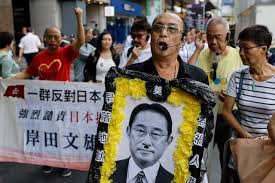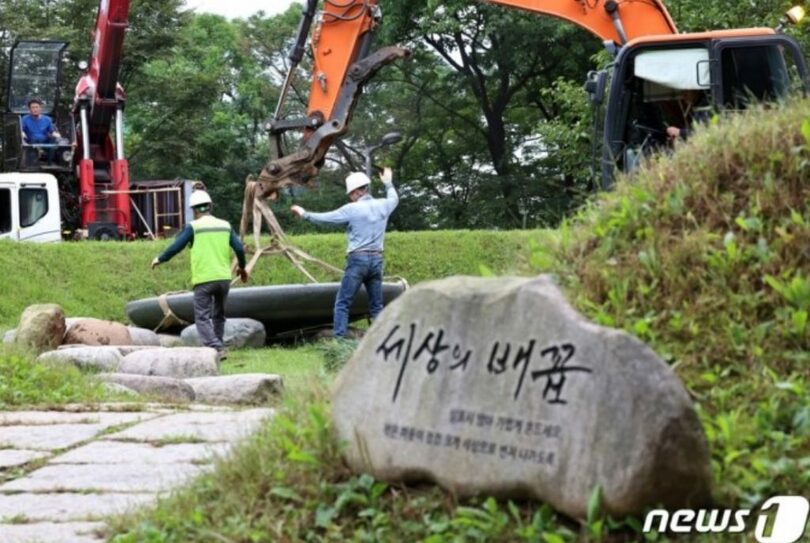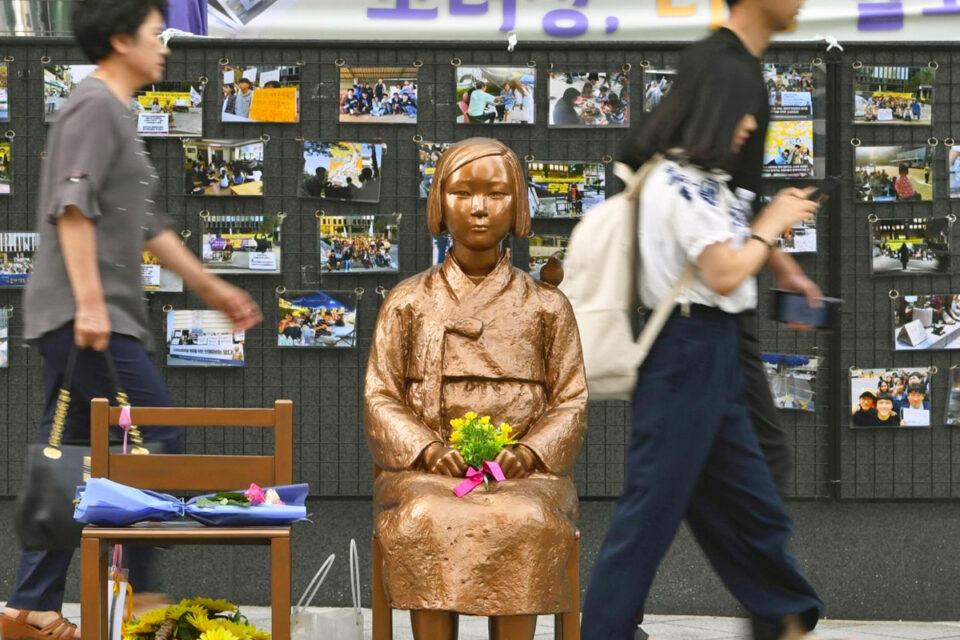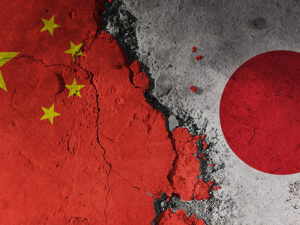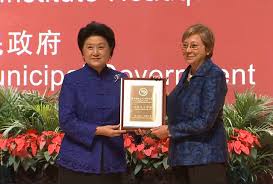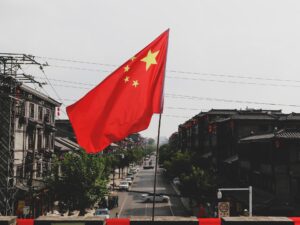Newsweek Nishikaku
<China is furious over the discharge of treated water from the Fukushima Daiichi Nuclear Power Plant. The Chinese, who are being flooded with the one-sided news of “a crime against humanity as a whole,” are saying, “I’m afraid of contaminated water! Japan is terrible! It is understandable that the Chinese, who are being bombarded with the one-sided news of “a crime against humanity,” would think, “I’m scared of contaminated water!
China is fiercely protesting the release of treated water from the Fukushima Daiichi Nuclear Power Plant. Following a complete embargo on seafood, it has also banned the use of processed products. The visit to China by Natsuo Yamaguchi, the leader of the New Komeito Party, has also been postponed at the request of the Chinese side. Let us consider why the opposition is so fierce.
First of all, as a basic premise, since the outbreak of the war in Ukraine, China, which has adopted a neutral or pro-Russia position, has been widening its distance (one might say confrontation) with Western countries, including Japan.
Recent events that have alarmed the Chinese government toward Japan, such as Taro Aso’s visit to Taiwan and the strengthening of security through the Japan-U.S.-South Korea summit, have occurred intermittently, and this trend is not likely to change, at least until the end of the war in Ukraine. For China, Japan is a “nation on alert” from a security perspective, incidental to the United States. To put it mildly, it is not seen as a “friendly” country.
If such a country were to hear that the water used to treat the meltdown was being discharged into the Pacific Ocean, it would be natural for it to take this as a moment of opportunity to check the situation.
The Chinese government’s best course of action
We also hear that China’s economy is currently deteriorating rapidly. The unemployment rate for 16- to 24-year-olds in urban areas has hit a record 21.3%, and real estate giant Hengda Group has filed for bankruptcy in the United States. Consumer spending is also slowing.
I visited Shanghai in July, and one of my Chinese acquaintances assured me that the economy was “bad” and that he was “worried about the future of young people. I was impressed that he did not use vague terms such as “not so good” or “not so subtle,” but rather, he stated unequivocally that the economy was “bad. It is no exaggeration to say that the sense of anxiety about the future swirling around China is the worst since the country’s reform and opening-up.
It is a common tactic in any country to turn domestic dissatisfaction and internal contradictions into a diplomatic ploy to inflame the public’s sense of crisis, but it is particularly conspicuous in China.
Furthermore, it has been pointed out that historical and territorial issues, which have long served as “diplomatic cards” against Japan, have lost much of their relevance in recent years. Indeed, many people (on both sides) feel that each of these issues has been discussed to the point of exhaustion, and that it is almost impossible to persuade the other side. Even with the Yasukuni issue, the prime minister’s visits to the shrine have ceased since 2013 and have not become a major flashpoint.
The U.S.-China confrontation, the deteriorating domestic economy, and the declining effectiveness of the history card: …… The contaminated water came out in such places as the following.
From the Chinese government’s point of view, this situation is a good time to advertise, “People of China, Japan’s treated water is safe. There is neither obligation nor merit for the Chinese government to advertise, “Dear Chinese people, Japan’s treated water is safe and there is nothing to worry about.
The Chinese people would like us to turn our attention away from the wrecked domestic economy and not to neglect our vigilance toward Japan. In the latter half of 2010, between the bombing and the Corona disaster, there was a clear increase in positive comments about Japan among Chinese visitors to Japan, such as, “All Japanese people are kind and I have good memories of Japan,” but this must have been intended to dampen the mood.
A Flood of Anti-Japanese News
Chinese Government on Treated Water Discharge: “It’s Dangerous! The basis for this claim is that the contaminated water generated during normal operation is completely different from the contaminated water generated by the accidental treatment of the meltdown.
When I first heard this argument, I thought, “Well, there you have it. I honestly do not understand the difference between the two. I would like to see experts in the field of nuclear power plants explain this in detail.
Science and technology, such as nuclear power plants and vaccines, are, after all, things that the layman (i.e., the majority of the general public) “doesn’t really understand. I have made my decision based on a vague understanding of the minimum theory I have read in newspapers and other media, and then I say, “Well, the experts say it is safe, so I guess it is safe.
The same applies to treated water. Based on a review of the ALPS treatment system on the METI website, I am assuming that the experts, the Japanese government, and TEPCO are not lying, and that the IAEA and other external checks are functioning properly, and that it should be fine.
In other words, I do not have a perfect understanding of the detailed mechanism of treated water at nuclear power plants and the pros and cons of its safety, nor do I have any assurances. I only have a vague understanding that “if it is being purified, it must be safe.
In this light, it is difficult to imagine Chinese people, who have been inundated with news over the past few days that “Japan has released dangerously contaminated nuclear water” and “this is a crime against the entire human race,” saying, “I’m afraid of contaminated water! Japan is terrible! It is not at all unreasonable for Chinese people to think, “I am afraid of contaminated water!
Explanation of the missing Chinese language
Although the effect may be limited, Japan could do a little better in its promotional activities for China and South Korea.
For example, in the presence of the IAEA, officials from the Fisheries Agency and TEPCO, like YouTubers, would wear protective clothing and say, “We are now going to check the safety of the treated water,” and measure the concentration of various radioactive materials in the contaminated water, and then measure the treated water after purification as well and say, “Look! Afterwards, they measure the purified treated water as well and say, “Look, the ALPS treated water is indeed safe.
No matter how much they say in words that the water is being purified, it is hard to believe that the Chinese government will believe the Japanese explanation so easily. Moreover, TEPCO has a record of providing false explanations after the accident. If the entire process could be shown on video, it would be much more convincing.
It may sound like a crude method, but “Prime Minister Kishida drinking treated water,” even if it may be called a performance, would also have a certain effect. Not only Prime Minister Kishida, but also celebrities such as Takafumi Horie, who is strongly in favor of the discharge, and the general public of volunteers could get together and hold a “drinking the treated water” party.
METI’s explanatory website, “Let’s all know. Let’s think about ALPS treated water” is available only in Japanese and English, which is also a great waste. Strongly opposed is the medium-unchangeable “doctrine.
Nevertheless, the claim that “Japan is committing a ‘crime against humanity’ by discharging nuclear contaminated water” has become an unchangeable “doctrine” determined by the Chinese government and is no longer at the stage where it can be overturned through logical explanation or argument.
Japan and China have fundamentally different institutional designs of statecraft; they have sacrificed no small amount of what we in the West take for granted as our right to peacefully govern our 1.3 billion people.
Since they are both Koreas, commentary in Chinese and Korean would be essential. One of these is something like “autonomous decision-making on social issues. There are currently 51 nuclear reactors in China, but there is never a debate over whether or not to build a nuclear power plant. This is because they are quickly built and put into operation without providing the public with any information that would cause a debate.
As much as possible, they do not release any information that would make the public uneasy or make them question the government’s decision. Whether good or bad, this is the basic premise on which the Chinese government operates the nation. Something may be fundamentally out of sync with democratic-style approaches such as “transparent disclosure of information and persistent accountability” to a country that takes such a stance.
The “Information War” of Unfavorable Rules
Not only in this case, but also in other Western countries, including Japan, there are reports of voices from various positions on social issues, both for and against the government. Naturally, they also report opinions opposing their own governments.
China takes the opportunity to highlight such opinions and use them to reinforce its own theory. In this case, too, the report concentrated on the Japanese fishing federations and experts who oppose the discharge, the voices of fisheries companies who say they are troubled by harmful rumors, and demonstrations against the discharge. As a result, there has been a mass production of news reports saying that the Japanese government is forcing the discharge of wastewater despite so many voices of opposition and concern in Japan.
People living in the super-massive filter bubble that is China must be very anxious, and it is understandable that they would want to hate Japan.
It has been a long time since the term “information warfare” came into use, but the information warfare between Japan and China is like a soccer game with one side playing with the rules allowing only one hand. They are able to delete inconvenient information within their own country and pick up and concentrate on what is convenient from the other team’s diverse discourse.
Japan has no chance in an information war against such an opponent. At the very least, it would be good if we could bring the game to a draw.
Not anti-China, not anti-China, but anti-Japan. ……
So what should we do?
In conclusion, I think we have no choice but to give up. What makes no sense at all is to harbor hatred toward China. Fomenting anti-Chinese and anti-Chinese sentiment will not solve anything.
For some time to come, the distance between Japan and China will grow further apart, and public sentiment between the two countries will cool. Japanese companies must have learned the risks of China from the experience of the past few years, and this trend may lead to a boycott of Japanese products. But then, a boycott of cosmetics has already begun.
A video circulating on the Chinese Internet shows a teacher in a classroom teaching students that “Japan has committed crimes against humanity” and instructing them to write an essay criticizing Japan. In the future, anti-Japanese sentiment among the Chinese will likely grow even stronger.
I don’t think that is a good thing, but it is inevitable. Inhabitants of a democratic world and inhabitants of a totalitarian world cannot help but understand each other.
I would recommend that you treat the Chinese as you would treat a friend who is addicted to a new religion.
Even with a person who is fully convinced of a new religion, you can have dinner together, enjoy a normal chat, laugh and help each other. But there are certain topics that should not be touched, or that we will never be able to understand each other if we do touch. In addition to historical and territorial issues, the pros and cons of treated water from nuclear power plants would be one of them.
There is no need to dislike or ridicule them. The attitude of “leaving China” or “giving up China” is required, not anti-Chinese or anti-Chinese.

